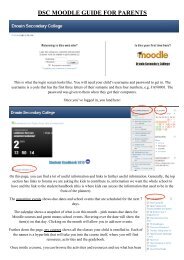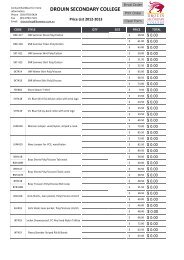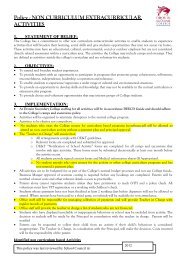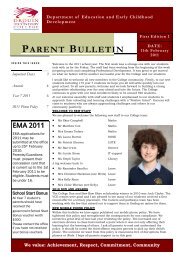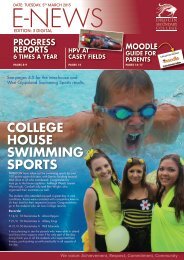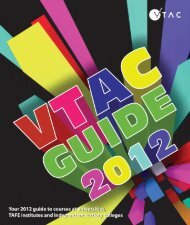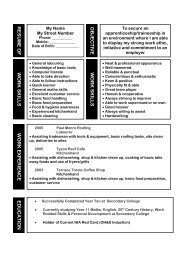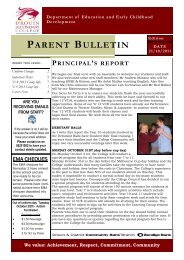POLICY: HEAD LICE - Drouin Secondary College
POLICY: HEAD LICE - Drouin Secondary College
POLICY: HEAD LICE - Drouin Secondary College
- No tags were found...
Create successful ePaper yourself
Turn your PDF publications into a flip-book with our unique Google optimized e-Paper software.
<strong>POLICY</strong>: <strong>HEAD</strong> <strong>LICE</strong>1. STATEMENT OF BELIEF:<strong>Drouin</strong> <strong>Secondary</strong> <strong>College</strong> believes that the safety and wellbeing of children is a whole-of-communityresponsibility. While parents/guardians have primary responsibility for the detection and treatmentof head lice, we also have a role in the management of head lice infections and in providing supportfor parents/guardians and students.The minimisation of anxiety by acknowledging that most schools will have some students with head liceat any given time.2. OBJECTIVES:The aim of this policy is to manage and control Head Lice outbreaks with a comprehensive managementplan that incorporates the following:Consent Form To Conduct Head Lice Inspections to be included in new enrolment packages (SeeSchedule 1) Head Lice Management Agreement ( See Schedule 2) Notice Of Detection / Response Form (See Schedule 3) Alert Notice (Schedule 4 )3. IMPLEMENTATION:This policy applies when a child is enrolled at <strong>Drouin</strong> <strong>Secondary</strong> <strong>College</strong>.DSC shall:nominate a head lice resource/support person (parent/guardian or staff member) whoparents/guardians can contact at the school at nominated times.4. EVALUATION:This policy will be reviewed by the Education Policy Committee as part of the school’s four year cycle.The school shall: provide advice and support to parents/guardians as per Head Lice Management Agreement (Schedule 2) Minimise anxiety by acknowledging that most schools will have some students with head lice at any giventime.Parents/guardians shall:• read and be familiar with the policy.•regularly inspect child/children’s hair for lice or lice eggs.This policy was last reviewed by School Council in:2012
<strong>POLICY</strong>: <strong>HEAD</strong> <strong>LICE</strong>CONSENT FORM TO CONDUCT <strong>HEAD</strong> <strong>LICE</strong> INSPECTIONSPermission to cover the duration of the student’s schooling at:Throughout your child’s schooling, the school will be arranging head lice inspections of students.The management of head lice infection works best when all children are involved in our screening program.The school is aware that this can be a sensitive issue and is committed to maintaining student confidentiality andavoiding stigmatisation.The inspections of students will be conducted by a trained person approved by the principal and school council.Before any inspections are conducted the person conducting the inspections will explain to all students what isbeing done and why and it will be emphasised to students that the presence of head lice in their hair does notmean that their hair is less clean or well kept than anyone else’s. It will also be pointed out that head lice can beitchy and annoying and if you know you have got them, you can do something about it.The person conducting the inspections will check through each student’s hair to see if any lice or eggs are present.Persons authorised by the school principal may also visually check your child’s hair for the presence of head lice,when it is suspected that head lice may be present. They do not physically touch the child’s head during a visualcheck.In cases where head lice are found, the person inspecting the student will inform the student’s year levelcoordinator and the principal. The school will make appropriate contact with the parents/guardians/carers.Please note that health regulations requires that where a child has head lice, that child should not return to schooluntil appropriate treatment has commenced. The school may request the completion of an ‘action taken form’,which requires parents/guardians/carers to nominate if and when the treatment has started.Parent’s/guardian’s/carer’s full name: ………………………………………………………Parent’s/guardian’s/carer’s full name: ………………………………………………………Address:……………………………………………….. Post code:…………………Name of child attending the school:…………………………………………………I hereby give my consent for the above named child to participate in the school’s head lice inspection program forthe duration of their schooling at this school.Signature of parent/guardian/carer: ……………………………. Date……………………Signature of parent/guardian/carer: ……………………………. Date……………………Please inform the school if guardianship/custody changes for your child, as this form will need to be re-signed to reflect thesechanges. Please also inform the school in writing if you no longer wish to provide consent for the school to undertake head liceinspections for your child.This policy was last reviewed by School Council in:2012
<strong>POLICY</strong>: <strong>HEAD</strong> <strong>LICE</strong><strong>HEAD</strong> <strong>LICE</strong> MANAGEMENT AGREEMENTBETWEEN SCHOOLS AND PARENTS/GUARDIANS/CARERSHead lice continues to cause concern and frustration for some parents/guardians/carers, teachers and children.Head lice do not transmit infectious diseases – they are transmitted by having head to head contact with someonewho has head lice. Whilst parents have the primary responsibility for the detection and treatment of head lice, thecontrol and management of head lice infections is a shared responsibility amongst a number of agencies, includingthe Department of Education and Training; Department of Human Services; schools and parents. The Department ofEducation and Training is responsible for providing advice and support to schools regarding head lice management.This agreement outlines the: Responsibilities of both the school and the parent/guardian/carer; Importance of an all inclusive health approach, to ensure an appropriate and efficient solution to the problemof head lice.ResponsibilitiesParent/Guardian/Carer - responsibilities include: Regularly (preferably once a week) inspecting their child’s hair to look for lice or lice eggs and regularlyinspecting all household members and then treating them if necessary; Ensuring their child does not attend school with untreated head lice; Using safe treatment practices which do not place their child’s health at risk (see the attached Treating andControlling Head Lice pamphlet). Notifying the school if their child is affected and advising the school when the treatment has started via anAction Taken form; Notifying parents or carers of your child’s friends so they too have the opportunity to detect and treat theirchildren if necessary.I have read and agree to the above responsibilities:Signature of parent/carer/guardian: ……………………………. Date……………………Signature of parent/carer/guardian: ……………………………. Date……………………School - responsibilities include: Distributing policies and information on the detection, treatment and control of head lice toparents/guardians/carers and staff and having accessible clear protocols for the inspection program that the schoolimplements; Developing a school policy on head lice which reinforces an accurate, consistent approach to themanagement of head lice infections, which is approved by the school council; Obtaining written parental consent to conduct head lice inspections, upon the enrolment of a student tocover the duration of their schooling at a particular school and to nominate a trained person/s to conduct the headlice inspections, who is approved by the Principal and school council; Encouraging those person’s authorised by the school principal, e.g. teacher, to visually check a student’shair, i.e. with no physical contact with the child, if the presence of head lice is suspected; Encouraging parents/guardians/carers to continue to regularly (preferably once per week) check their childfor head lice and providing a sympathetic attitude and practical advice to those parents experiencing difficulty withthe control measures; Encouraging students to learn about head lice so as to help remove any stigma or ‘bullying’ associated withthe issue; Being aware that the responsibility to exclude a child from a school rests with the principal or person incharge of the school and being aware that exclusion only refers to those children who have live head lice and doesnot refer to head lice eggs; and being aware of the recommendation that students should be excluded from school atthe conclusion of the school day where the student should be provided with a note to take home to inform the parentthat their child may have head lice. Being aware that there is no requirement in the Health (Infectious Diseases) Regulations 2001 for a childtreated for head lice to obtain a clearance certificate to be issued either by a general practitioner or a municipalcouncil, on return to school. Where appropriate, and at the principal’s discretion, providing an alert notice to the school community, whenhead lice has been detected in the school; Encouraging parents/guardians/carers to identify treatment used and the commencement date, via an ActionTaken form.This policy was last reviewed by School Council in:2012
<strong>POLICY</strong>: <strong>HEAD</strong> <strong>LICE</strong><strong>Drouin</strong> <strong>Secondary</strong> <strong>College</strong> is committed to managing head lice in a sensitive and confidential manner. We arecommitted to the above responsibilities.Signature of Principal……………………………. Date……………………This policy was last reviewed by School Council in:2012
<strong>POLICY</strong>: <strong>HEAD</strong> <strong>LICE</strong>They’re Back ……Dear Parents/Guardians/Carers,It has come to my attention that some students in the school may have head lice and I seek yourcooperation in checking your child’s hair this week (insert date __/__/__ to __/__/__).Head lice do not transmit infectious diseases – they are transmitted by having head to head contact withsomeone who has head lice. You may be reassured to know that head lice are commonly found in placesother than at <strong>Drouin</strong> <strong>Secondary</strong> <strong>College</strong>. Head lice are common in school-aged children and are the mostadaptable of creatures. They have survived living solely on humans for 10,000 years!!!!What can you do?I seek your cooperation in checking your child’s hair and in those instances where head lice or eggs arefound, treating your child’s hair.Please see the attached pamphlet Treating and Controlling Head Lice, from the Department of HumanServices. This pamphlet has informative guidelines regarding detecting and treating head lice and eggs.How do I treat my child for head lice?The attached pamphlet (as noted above) has informative guidelines regarding detecting and treatinghead lice and eggs. The school also has additional information available regarding treatment andcontrolling head lice. Please don’t hesitate to contact Maureen Hickman on, 03 56251002 to obtain thisinformation.If head lice or eggs are found on your child’s hair you need to inform: the school and advise when the treatment has started, via the attached Action Taken Form. parents or carers of your child’s friends so they too have the opportunity to detect and treat theirchildren if necessary.When can my child return to school?Health regulations requires that where a child has head lice, that child should not return to school untilthe day after appropriate treatment has started. Please note, this refers only to those children who havelive head lice and does not refer to head lice eggs.<strong>Drouin</strong> <strong>Secondary</strong> <strong>College</strong> is aware that head lice can be a sensitive issue and is committed tomaintaining your confidentiality.Kind regardsShane WainwrightPrincipalDate……………………This policy was last reviewed by School Council in:2012
<strong>POLICY</strong>: <strong>HEAD</strong> <strong>LICE</strong>Dear Parent/Guardian/Carer,Head lice or eggs are suspected to have been detected on your child and it is very important for you totreat your child as soon as possible, using safe treatment practices. Please see the attached pamphlet,Treating and Controlling Head Lice, from the Department of Human Services. This pamphlet hasinformative guidelines regarding detecting and treating head lice and eggs.It is very important for you to notify <strong>Drouin</strong> <strong>Secondary</strong> <strong>College</strong> and to advise when appropriate treatmenthas commenced.It is important to note, that health regulations require that where a child has head lice, that child shouldnot return to school until the day after appropriate treatment has started. Please note that this refers onlyto those children who have live head lice and does not refer to head lice eggs.Please complete the below form and provide this to Mr. Shane Wainwright on the return of your child toschool.…………………...………….………………………………………………………………………Action Taken – Student Head LiceParent/Guardian/Carer Response FormTo: Mr. S. WainwrightCONFIDENTIALStudent’s Full Name: _____________________________Year Level: ______I understand that my child should not attend school with untreated head lice.I used the following recommended treatment for head lice or eggs for my child________________________________________.Treatment commenced on (insert date)___/ ___/___Signature of parent/carer/guardian: ……………………………. Date……………………This policy was last reviewed by School Council in:2012
<strong>POLICY</strong>: <strong>HEAD</strong> <strong>LICE</strong>This policy was last reviewed by School Council in:2012



